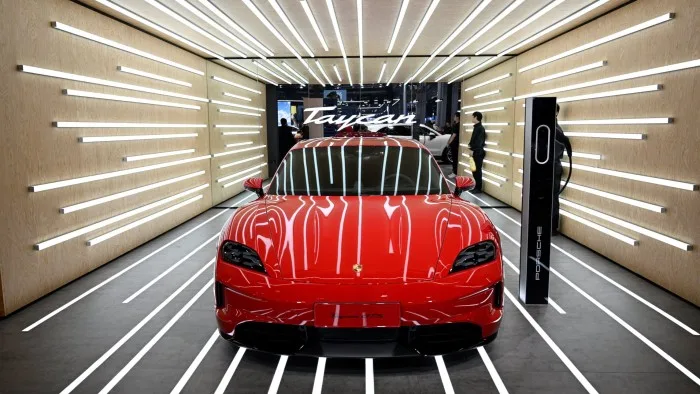Unlock the Editor’s Digest for free
Roula Khalaf, Editor of the FT, selects her favourite stories in this weekly newsletter.
Profits at Porsche and Volvo Cars fell sharply in the first quarter as the two European manufacturers warned of a heavy toll on the industry from Donald Trump’s trade war.
The automotive industry has rushed to cut costs and protect cash flows after the US president imposed a 25 per cent tariff on all imports of foreign-made cars from early April, with some exemptions for Mexico and Canada. A separate 25 per cent levy on auto parts is due to take effect from May 3.
Trump is planning to spare carmakers from some of his most onerous tariffs such as those on steel and aluminium, in a climbdown following intense lobbying by industry executives. But uncertainty over the final shape of his tariffs has made it difficult for companies to calculate their cost.
Porsche on Tuesday said its group operating profit slumped 40 per cent in the first quarter to €762mn, compared with €1.28bn in the same period last year, due to negative effects from tariffs, costs associated with its pivot away from focusing solely on battery vehicles and a decline in vehicle deliveries.
Chief financial officer Jochen Breckner said the company expected the environment to “remain challenging”, adding that “we can’t completely escape this, but we are doing everything within our power to counteract it”.
The luxury-car maker is particularly exposed to the US tariffs as it manufactures all its cars in Germany. It has also suffered from declining sales in China.
Late on Monday, the Stuttgart-based company said it expected its full-year return on sales margin to be in a range of 6.5-8.5 per cent, compared with previous guidance of 10-12 per cent.
Porsche’s second guidance cut in two months reflected “negative impacts” from US tariffs for April and May, but additional planned tariffs were not yet included. Its shares fell 1.1 per cent on Tuesday morning.
Porsche said a decision against expanding production at its battery maker Cellforce because slowing demand for its electric vehicles, driven by a drop in China, would contribute to a rise in “special expenses” in 2025 from €800mn to €1.3bn.
Separately on Tuesday, Volvo Cars launched a SKr18bn ($1.9bn) cost-cutting programme and pulled its guidance for this year and 2026 because of tariff uncertainty after reporting a 59 per cent drop in operating profits.
“Given the turbulence in the market, we need to further protect our cash flow generation and lower our fixed costs,” said Håkan Samuelsson, who returned as chief executive this month to navigate the US tariffs.
Samuelsson said details of headcount reduction would be made public later. Shares in the carmaker dropped 9 per cent on Tuesday.
For the first months of the year, Volvo reported an operating profit of SKr1.9bn, down from Skr4.7bn a year earlier and far less than the SKr2.7bn analysts had expected, according to S&P Capital IQ.
In February, the company warned of lower profits and volumes this year, while aiming for a core operating profit margin of 7-8 per cent in 2026.

